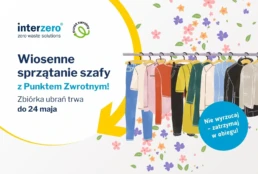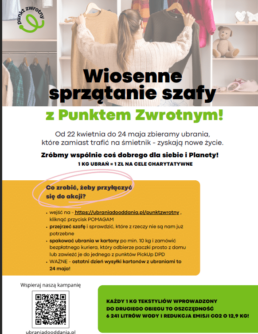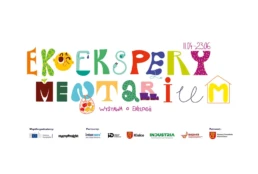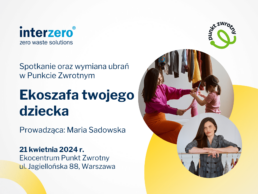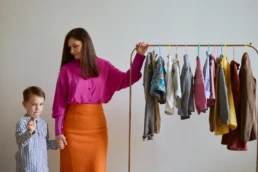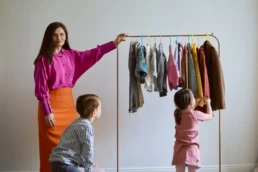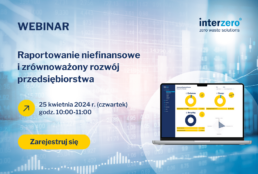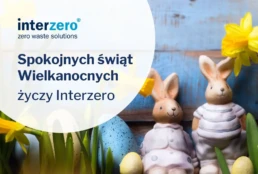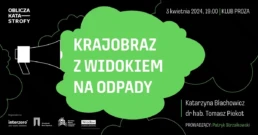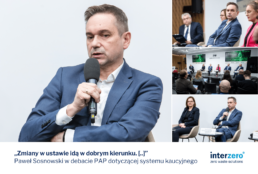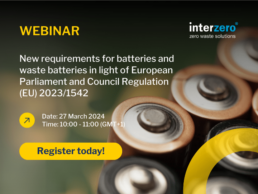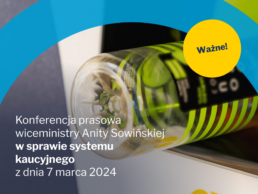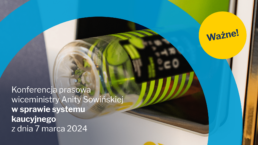Clean out your wardrobe for spring! Take part in a clothes collection with Return Point and Clothes to Donate
Clean out your wardrobe for spring! Take part in a clothes collection with Return Point and Clothes to Donate
Let's do something good for ourselves and the Planet together!
Together with Turning point i Clothes to donate To 24 May we collect clothes that will gain a second life instead of ending up in the rubbish heap. Go through your wardrobe, see what could be useful to others and do something good for the environment.
How to join in?
- Enter: https://ubraniadooddania.pl/punktzwrotny
- Prepare clothes and pack them in cartons of min. 10 kg.
- Request a free courier to collect parcels from your home or take them to a DPD PickUp point.
What clothes are we collecting?
New and second-hand items suitable for secondary circulation, without holes, damp patches, stains, clean, complete and undamaged:
- all items of clothing for women, men, children, babies;
- paired shoes;
- accessories: e.g. handbags, backpacks;
- accessories: e.g. hats, scarves;
- home textiles, e.g. blankets, bedding;
- jewellery;
- underwear.
The money for every kilo of textiles collected will go to the Social Weave Foundation. It is a foundation that has created a centre in Warsaw's Praga district for the exchange of objects, a place where you can leave what you no longer need and take something you find useful.
4 June Let's meet together at the Turning Point (13:30) to take stock of this fruitful school year at the EcoCentre, present plans for further activities and see how many clothes we managed to collect together!
Join the action today!
Eco-experimentarium exhibition in Kielce!
EcoExperimentarium exhibition in Kielce!
The next stop on the route of the interactive exhibition EcoEkspetymentarium is Kielce. You are cordially invited to visit the exhibition covered by the Interzero partnership to the Main Gallery of the Institute of Design at 3 Zamkowa Street in Kielce. The exhibition will be available from 11 April to 23 June 2024.
Opening hours
For organised groups: Tues.-Thurs. 9:00 a.m. - 2:00 p.m. - LINK TO REGISTRATION HERE
For individuals: Tue-Thu 14:00 - 17:00 / Fri-Sun 9:00 - 17:00
Why is it worth it?
This is a great opportunity to learn more about the climate and eco-friendly attitudes. The exhibition is built on the layout of a house - in the living room you will learn how to save energy, in the bathroom you will take care to use every drop of water, and in the kitchen you will learn about ways to cook in a zero waste style. This is a great opportunity for both young and old to learn and spend time in an interesting and useful way.
Admission to the exhibition is free! You are cordially invited.
Details here: https://ekoeksperymentarium.pl/
Your child's eco-café - Workshop with Maria Sadowska
Your child's eco-café - Workshop with Maria Sadowska
Circular fashion is an approach to fashion that focuses on reducing waste, using resources sustainably and minimising environmental impact. In contrast to the traditional 'linear' model - where products are made, used and finally thrown away - in the circular model we aim to extend the life cycle of products through repair, reuse, reprocessing and recycling.
Circular fashion can also be applied in the context of parenting and children's wardrobe, which is why we are organising together with the Turning point meeting with Maria Sadowska - expert in sustainable, circular and quality fashion, organiser of circular fairs and workshops, project manager, secondary stylist and mother of two children of the 'circular generation'.
As part of the meeting, which will already take place 21 April at 10am find out how:
- build your child's wardrobe in the second round,
- choosing children's clothes made of natural materials / what to look out for,
- read clothing labels,
- complete the styling,
- take care of the clothes in a child's wardrobe,
- beware of chemicals in clothing
- and where to find clothes of very good quality in the second circuit.
The meeting will also be an opportunity to exchange clothes. You are encouraged to bring both your own and your children's clothes. Whatever does not find a new owner can be thrown into the campaign box. Clothes to donate.
You are invited to the event with your children - there will be entertainers waiting to provide fun and a breather for workshop participants.
Introducing fashion circularity into children's wardrobes can bring many benefits, both for the environment and for parents' wallets. In addition, it teaches children the value of sustainable living and caring for the environment from an early age.
Sign up for the event HERE
You can find out more about our collaboration with Turning Point and the project concept in the HERE
Participate in the training course "Non-financial reporting and corporate sustainability"
Attend the training course 'Non-financial reporting and corporate sustainability'.
You are cordially invited to a webinar entitled. "Non-financial reporting and corporate sustainability", which will already take place on 25 April 2024 (Thursday).
The online training will be led by: Przemyslaw Kuna, Managing Director at Interzero
Scope of the webinar:
- Context of change and implications of ESG
- Environmental Sustainability Dashboard - an Interzero tool
- Involvement of the company in the reporting process
More details and the registration page can be found at HERE
Registration for the webinar runs until: 25 April 2024 at 8:00 am.
You are welcome!
UPDATE of 08.05.2024.
The online training course telling the story of Interzero's Environmental Sustainability Dashboard service to support non-financial reporting and corporate sustainability can be replayed on Interzero Academy. Link to website: https://academy.interzero.pl/sklep/raportowanie-niefinansowe-i-zrownowazony-rozwoj-przedsiebiorstwa/.
Happy and cheerful Easter
Happy and cheerful Easter
On the occasion of the upcoming Easter holidays, we would like to extend our warmest wishes full of joy, health and prosperity.
We believe that this coming time will be an opportunity for you to rest, reflect and spend time with loved ones and friends. May the traditions and customs of Easter remind us of the values that are most important in life - love, peace and kindness!
The Interzero team
Explore the faces of waste - Interzero's collaboration with Wrocław House of Literature
Explore the faces of waste - Interzero's collaboration with Wrocław House of Literature
The media are increasingly covering the topic of waste, sometimes triggering heated debates. Listening to the opinions of Poles and women alike, it appears that many people express a reluctance to separate their rubbish, question the effectiveness of recycling and doubt the possibility of making significant changes. People often wonder what impact they can really have and whether changes in their behaviour have a wider impact.
Poland officially has one of the lowest per capita municipal waste generation rates in Europe, but what does the situation really look like in the long term? We encourage you to participate in the following events to reflect on this together.
Faces of Disaster #11. Landscape with a view to waste - listen to the conversation
At the April meeting of the 'Facing the Catastrophe' series, we will consider the state of waste management in Poland, who is responsible for waste and why we are talking about a waste crisis today. However, the most important aim of the discussion will be to try to answer the question of how to talk about waste and what language to use to inspire people to change their attitudes, habits and take action for the environment we all live in.
The interview will involve Katarzyna Blachowicz (an expert on recycling, waste, sustainability and the circular economy) and Dr. Tomasz Piekot (linguist, communicator from the University of Wrocław). The meeting will be hosted by Patryk Strzałkowski (Gazeta.pl journalist).
Time: Wednesday 3 April, 7 pm
Location: Klub Proza | Wrocław House of Literature (Przejście Garncarskie 2)
Free entry
The meeting will be streamed online. It will be available to watch on the following facebook pages Wrocław House of Literature, Wrocław City of Literature UNESCO, Interzero Poland, Eco-friendly without the frills i Prose Club. Join the event today! Click HERE
"Faces of Disaster" is a series of discussions around the most pressing issues related to environmental disasters, where the starting point is always books. The aim of the project is to broaden knowledge of climate change and human impact on the environment, to raise environmental awareness and to initiate conversations on environmental and climate protection activities. Invited authors, publicists, sociologists, activists, experts and observers of environmental change give talks on topics such as: depletion of drinking water resources and water conflicts, migration crises, land, energy and raw material appropriation, overproduction, the food crisis and overconsumption, and social and communication exclusion. The 'Faces of Disaster' series has received the honorary patronage of Mayor of Wrocław Jacek Sutryk.

Katarzyna Blachowicz is Vice President of the Management Board of the Recycling Co-operation Centre - not for profit system Sp. z o. o., the company coordinating the activities of the Waste Management and Recycling Cluster - National Key Cluster (since 2018). It coordinates, initiates, organises and supports within the Cluster, among others, activities for the development of innovation, competitiveness and, above all, mutual business cooperation between companies and scientific institutions related to waste management and recycling. It coordinates the activities of the Recycling Academy, which provides comprehensive education for employees, management and other interested persons of companies and institutions related to the waste management, recycling and closed-loop economy industries, as well as education of the society in this field.

Dr Tomasz Piekot is a linguist and communicator, interpersonal and social communication trainer, university teacher. Head and co-founder of the Simple Polish Language Workshop at the University of Wrocław. Author of books on effective writing. Editor of the scientific journal "Oblicza komunikacji".
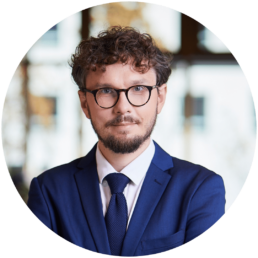
Patryk Strzałkowski is a journalist at Gazeta.pl since 2015, where he is responsible for the inter-editorial Green Desk and the website Zielona.Gazeta.pl. He specialises in climate and environment and foreign topics. Author of, among others, the series Fridays for Climate, reports from the Middle East and other parts of the world. Host in the programme Poranna rozmowa Gazeta.pl (formerly Zielony Poranek). Graduate of journalism at Adam Mickiewicz University in Poznań and the Polish School of Reportage. Member of the Oxford Climate Journalism Network. Winner of the "Journalist for the Planet" award, awarded as part of Radio ZET's Andrzej Woyciechowski Prize in 2023.
The Faces of Litter - Join us for a children's workshop with Kama Morawska
During the workshop, we will reflect on the words used to refer to rubbish, and how language influences our perception of reality. We will try to find the differences in meaning of the words: RENEW, RAPE recycle, WASTE don't have. Participants will also create a collage out of unwanted and unwanted books, newspapers, maps and papers to promote a zero-waste approach to used items.
Time: 7 April, 11.00 am - 12.30 pm
Location: Klub Proza | Wrocław House of Literature (Przejście Garncarskie 2)
Children aged 6-12 years are invited to participate.
Registration for the event is required at info@literatura.wroclaw.pl (order of application decides).
The workshop will be led by Kama Morawska, or Doctor of Philosophy and author of the philosophy workshop for children 'Images of Philosophy', which she has been running at the Secret Sets since 2014. She has written a philosophy booklet for children 'Philosophy at hand, so practice philosophy'. She continues to take a keen interest in how and what little people think.
Join the event on FB HERE
Visit the Wrocław Literature House website for more information
Debate "Are we ready to implement a bail system in Poland?" PAP Media Room
Debate "Are we ready to implement a bail system in Poland?" PAP Media Room
Yesterday, i.e. 13 March at 13:00, the debate "Are we ready to implement a bail system in Poland?" took place, organised by the PAP Business. The event, on behalf of Interzero, was attended by Pawel Sosnowski, Board representative for environmental regulation.
Passed at the end of the last legislature, the bill on the bail system will come into force on 1 January 2025. Its provisions raised many objections from the industry, which called for a postponement of the entry into force of the new legislation and a revision of the draft. The debate focused on finding answers to key questions about the scheme:
- What are the objectives of introducing a bail system in Poland
- Main advantages and disadvantages of the solutions adopted by the legislator in the bail system
- Main proposals for amendments to the Deposit Scheme Act
- Position of the Ministry of Climate and Environment on the solutions adopted in the draft law
- Experience from other European countries implementing similar solutions
- Is the industry ready to implement the law from 1 January 2025?
- Operational tasks required for the operation of the system, broken down by key stakeholder groups
- Is the deposit scheme managed by one or several operators?
- Recommendations for action to rapidly generalise the bail system
Will it be possible to launch bail schemes in 2025?
"I think it is. We know that the bail system will be in place in Poland as early as 2025, and the law was published last September, so those who intend to set up these bail systems have been working on it for some time now. Of course, time is short, probably on 1 January these systems will not be up and running, but in the following months they probably will." - said Pawel Sosnowski
"The changes to the Act go in the right direction. They are not revolutionary changes, but supplement these provisions with necessary corrections that were expected by entrepreneurs. In these changes that have been proposed, I missed a coordinator of bail systems - a so-called umbrella institution that would synchronise the activities of several bail systems, following the example of the German institution set up by entrepreneurs. I am also missing a proposal to improve the collection of waste from commercial units, that is, to reduce the administrative requirements for the transport of packaging waste. This would also reduce the carbon footprint, as waste could be collected from shops in the same vehicles as the products are delivered." - comments Pawel Sosnowski
The packaging revolution is fast approaching. There are only a few months left to adapt to the new legal realities. If you market beverages in packaging covered by a deposit system, you can fulfil your statutory obligations on your own by calculating and paying a product fee or by joining a deposit system in which a representative entity will be responsible for fulfilling the statutory obligations.
Polish Chamber of Recovering and Recycling of Packaging (PIOIRO) create a representative entity and entrust Interzero tasks associated with building and operating a bail system. Trust the experts and join us. More information HERE
The transcript of the debate is available at HERE
Photos: PAP MediaRoom
Entrepreneur, remember to submit your annual CO2 emissions report for 2023
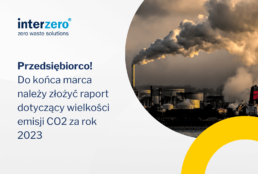
Entrepreneur, remember to submit your annual CO2 emissions report for 2023
We would like to remind you that until 31 March 2024. the operator of the installation or aircraft operator is required to submit to the National Balancing and Emission Management Centre (NABM) the verified annual report for 2023, i.e. the annual emission report together with the verification report. By the same date, the operator or aircraft operator shall submit a copy of the report and a copy of the report to the authority competent to issue the permit.
The documents should be prepared on Excel-formatted forms based on the forms and guidelines promulgated by the European Commission, available on the website of the National Centre at www.kobize.pl under "Downloads".
More information HERE
For our customers using the environment whose activities cause emissions, Interzero prepares and enters into the National Base, by the end of February each year, a report containing the information indicated in Article 6(2)(1) to (10) of the Act of 17 July 2009 on the system for managing emissions of greenhouse gases and other substances, concerning the previous calendar year.
Need more information on air emissions and your responsibilities? Take advantage of the training on Interzero Academy.
- TRAINING | The most common errors in emissions and waste reporting
- TRAINING | Obligations of businesses regarding air emissions
More training here: https://academy.interzero.pl/
If you are unsure whether your company is meeting its environmental obligations correctly, use the Environmental Audit conducted by our experts!
Take part in the international Interzero webinar "New requirements for batteries and waste batteries in light of Regulation (EU) 2023/1542 of the European Parliament and of the Council"!
Take part in the international Interzero webinar "New requirements for batteries and waste batteries in light of Regulation (EU) 2023/1542 of the European Parliament and of the Council"!
You are hereby invited to a webinar entitled. "New requirements for batteries and waste batteries in light of Regulation (EU) 2023/1542 of the European Parliament and of the Council", which will take place on 27 March 2024 (Wednesday).
The online training will be conducted by: Przemyslaw Kuna, Managing Director of Interzero Polska
Scope of the webinar:
- sustainability and safety requirements
- labelling and marking requirements
- the role of introducers, importers and distributors
- implementation of due diligence systems
- management of battery waste, including extended producer responsibility
More details and the registration page can be found HERE
Registration for the webinar is open until: 27 March 2024 at 8:00 am.
Register today!
Join the event on LinkedIn HERE
Amendments to the law on the bail system in Poland
Amendments to the law on the bail system in Poland
On 7 March, a press conference was held at which Anita Sowinska, Deputy Minister for Climate and Environment, spoke about the proposed changes to the bail system.
What will change?
- VAT-free deposit. Both single-use and reusable packaging will be exempt from VAT.
- The bail will 'follow' the packaging. As in other countries with a bail system.
- Deposit amount - 50 gr for plastic packaging and for metal cans and £1 for glass bottles.
- Obligation for small shops that sell such beverages to accept reusable glass packaging.
- Inclusion of dairy packaging from 2026.
- Inclusion of standard reusable glass packaging.
- Harmonised labelling system for returnable packaging - common returnable packaging symbol and barcode.
View a transcript of the conference HERE
As Interzero, we are ready for the upcoming statutory changes. You can already familiarise yourself with our offer Bottle machinesthat will make it easier for you to collect returnable packaging in your retail network.
We also offer expert advice to companies setting up and participating in a deposit system: to manufacturers and distributors and to representative entities. We provide a comprehensive service for deposit systems with regard to, among other things, the collection and logistics of packaging and packaging waste and its management. You can join a system set up by us and PIOIRO in order to be guaranteed to meet your statutory obligations. More information HERE
